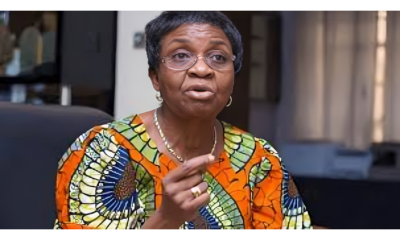Foreign News
Covid -19: UNICEF Raises the Alarm Over Possible Increase in Child Deaths

By Laide Akinboade, Abuja
United Nations Children Funds, UNICEF, has raised the alarm over possible increase of about 20% in deaths of children under 5, in Nigeria in less than 6 months.
In a statement issued in Abuja and made available to journalists, UNICEF said the deaths will be from preventable causes over the next six months as the COVID-19 pandemic disrupts routine services and threatens to weaken the health system.
According to the statement, an additional 950 Nigerian children could die every day .
The statement reads: “Globally, 6,000 additional children under five could die every day.
“The estimate is based on an analysis by researchers from the Johns Hopkins Bloomberg School of Public Health, newly published in The Lancet Global Health journal“.
UNICEF, therefore, warned that these disruptions could result in potentially devastating increases in maternal and child deaths.
The analysis offers three scenarios of the potential impact of COVID-19 in 118 low- and middle-income countries, including Nigeria. In the worst-case scenario, the estimate is that an additional nearly 173,000 under-five deaths could occur in just six months, due to reductions in routine health service coverage levels – including routine vaccinations – and an increase in child wasting.
“In Nigeria, these potential child deaths would be in addition to the 475,200 children who already die before their fifth birthday every six months – threatening to reverse a decade of progress in ending preventable under-five child mortality in Nigeria”.
About 6,800 more Nigerian maternal deaths could also occur in just six months, the statement said.
UNICEFExecutive Director Henrietta Fore, said, “Under a worst-case scenario, the global number of children dying before their fifth birthdays could increase for the first time in decades.
“We must not let mothers and children become collateral damage in the fight against the virus.”
Peter Hawkins, UNICEF Nigeria’s Country Representative, said, “We have made steady progress in reducing preventable child and maternal deaths in Nigeria over the last 20 years – and it would be devastating if that progress is lost or reversed – devasting for Nigerian families, communities and for the country as a whole.”
“The under-five mortality rate has declined gradually over the last two decades in Nigeria – from 213 deaths per thousand in 1990 to 120 today. This is likely due to improved access and coverage of key lifesaving interventions at primary health care and community levels and improved immunization rates.
“But in countries with still overall weak health systems, like Nigeria, COVID-19 is causing disruptions in medical supply chains and straining financial and human resources. Visits to health care centres are declining due to lockdowns, curfews and transport disruptions, and as communities remain fearful of infection.
“According to the modeling, and assuming reductions in coverage in the worst-case scenario, the 10 countries that could potentially have the largest number of additional child deaths are: Bangladesh, Brazil, Democratic Republic of the Congo, Ethiopia, India, Indonesia,Nigeria, Pakistan, Uganda and United Republic of Tanzania.
“The 10 countries that are most likely to witness the highest excess child mortality rates under the worst-case scenario are: Djibouti, Eswatini, Lesotho, Liberia, Mali, Malawi, Nigeria, Pakistan, Sierra Leone and Somalia.
“The estimates in this new study show that if, for whatever reason, routine health care is disrupted, the increase in child and maternal deaths will be devastating,” said Hawkins.
“What this study also shows is the critical importance of continuing to provide of life-saving services during these challenging times.
“We need to continue to deliver children into a safe pair of hands at a well-equipped clinic; we need to continue to ensure newborns receive their essential vaccinations and have their births registered; and we need to continue to ensure children get the essential nutrition they need to survive and thrive beyond their first day and throughout their childhoods,” he stressed.
Foreign News
Israeli-Iran War: Expert Outlines Risks, Upsides for Nigerian Economy

An economist, Dr Muda Yusuf, says the outbreak of war between Israel and Iran portends a combination of risks and upsides for the Nigerian economy, amidst the challenges of an already floundering global economy.Yusuf, Chief Executive Officer, Centre for the Promotion of Private Enterprise (CPPE), made this known on Sunday in Lagos in a statement.
He noted that economies around the world currently grappled with elevated geopolitical tension triggered by the Russian Ukraine war and now the Israel -Hamas conflict. The expert said that energy cost escalation, high interest rate implications and money supply growth were the risks of the conflict.He noted that a major driver of energy prices in Nigeria was the global crude oil price and with the outbreak of the Israeli-Iranian war, crude oil prices surged to 75 dollars per barrel from 65 dollars per barrel a week before.“This is a 15 per cent jump within days and has obvious implications for petroleum product prices globally.“Economies around the world; Nigeria inclusive, would witness a surge in the price of petrol, diesel, jet fuel, gas and related products in the near term.“This would have far reaching implications for many economies and businesses,” he said.Yusuf added that there was a risk of high monetary growth with an increase in revenue from the oil sector.He noted that money supply increased in the Nigerian economy as oil revenue increases because of the monetisation of oil receipts.According to him, this can pose additional inflation risk and exchange rate depreciation risk.The economist noted that this might also provoke tighter monetary policy stance, which could result in difficult credit conditions for businesses.Yusuf, however, said the historically positive correlation between crude oil prices, Gross Domestic Product (GDP) growth, and stock market performance.He said the outlook for the Nigerian stock market was therefore likely to be positive in the current context.As upsides for the Nigerian economy, Yusuf asserted that should the current conflict persisted and escalated, the surge in crude oil price would impact foreign exchange earnings with oil being the biggest earner for the country.“This would even be more impactful if output performance improves.“Crude oil price has surged to $75 per which is about 15 per cent higher than before the outbreak of the Israeli–Iran conflict.“This development would also positively impact the country’s foreign reserves, ensure better foreign exchange liquidity and ultimately the stability of the naira exchange rate,” he said.Yusuf added that the development would also positively impact the country’s revenue as the oil sector currently accounted for about 50 per cent of government revenue.According to him, an improvement in crude oil price would therefore have a significant impact on government revenue.He added that improvement in revenue would positively impact fiscal consolidation and hopefully moderate the growth of the fiscal deficit.“Investments in the oil and gas sector would post better returns if the conflict persists.“High oil price is good news for upstream oil and gas investors,” Yusuf said. (NAN)Foreign News
Trump Tells Iran to Make Nuclear Deal ‘Before it is too Late’

U.S. President Donald Trump has called on Iran to conclude an agreement with Washington on its controversial nuclear programme, amid a series of Israeli strikes on nuclear facilities and military leaders.
“There is still time to make this slaughter come to an end,” Trump wrote on his social media platform Truth Social on Friday.
“Iran must make a deal, before there is nothing left, and save what was once known as the Iranian Empire,” Trump continued.
“JUST DO IT, BEFORE IT IS TOO LATE.”Observers consider it unlikely that Iran’s leadership would opt for a diplomatic approach in light of the Israeli attacks.
Israeli media reported that Tehran had retaliated with an attack involving about 100 drones, all of which were shot down.
“I gave Iran chance after chance to make a deal,” Trump wrote.
“The U.S. makes the best and most lethal military equipment anywhere in the World, BY FAR, and Israel has a lot of it, with much more to come and they know how to use it,” Trump wrote. (dpa/NAN)
Foreign News
Pope Leo Prays for Victims of Austrian School Shooting

Pope Leo XIV said on Wednesday that he was praying for the victims of the mass shooting in a school in the Austrian city of Graz.
“I would like to express my prayers for the victims of the tragedy at the Graz school,” Leo said during his weekly audience in the Vatican.
Leo added that he is keeping the families, teachers, and fellow pupils in his thoughts.
According to police, a 21-year-old former pupil at the school entered the grounds on Tuesday and opened fire, killing 10 pupils aged between 15 and 17 as well as a teacher.
He then shot himself.
Eleven people remain in the hospital, most of them in intensive care.
All are now reported to be in a stable condition.
Graz, in south-eastern Austria, is home to around 300,000 people. (dpa/NAN)
































